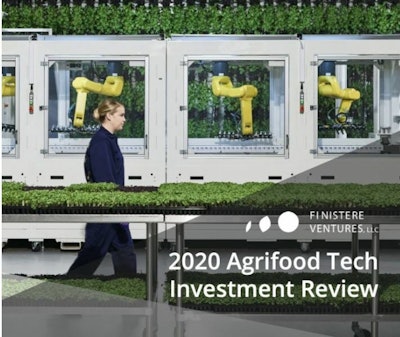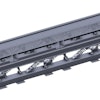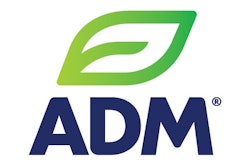
Finistere Ventures has unveiled the latest findings of its AgriFood Tech Investment Review series, which provides a comprehensive assessment of global agrifood tech financing activity and breaks down important trends by region, subsector and stage for both agtech and foodtech ecosystems.
According toFinistere Ventures’ 2020 AgriFood Tech Investment Review, a report developed in collaboration with PitchBook Data, total global investment in agrifood tech companies in 2020 surged to a colossal $22.3 billion – $5B in agtech and $17.3B in foodtech – continuing to grow at 50% CAGR (2010-2020); Finistere expects 2021 to exceed this record year based on early investment data.
“While 2020 presented some interesting and, at times, surprising outcomes for the agrifood sector, we saw fear turn into fear of missing out (FOMO) with favorable results for startups, particularly those in later stage situations with meaningful revenue and strong growth stories," says Arama Kukutai, co-founder and partner, Finistere Ventures.
Low interest rates and a soaring equity market have provided a backdrop unseen in the relatively short history of the sector. Investors attracted to the potential disruption of massive total addressable markets fueled increases in investment across all stages and segments."
The report provides a detailed analysis of which sub-sectors earned the most investor interest in 2020 (from whom and why), breaks out investment trends by region and stage over the course of the decade, evaluates exit values, and includes a preliminary look at investment activity in early 2021.
Based on the report, the race for innovation access is heating up and creating a new level for agrifood investing. A renewed focus on climate change and carbon offsets is gaining momentum, and rising ESG interest is spilling over into venture-backed companies across agrifood.
Involvement from new or non-traditional players – family offices, large pension and sovereign wealth groups, late-stage PE – swelled and the role of CVCs across the space continued to grow. In fact, 2020 saw 8,054 unique investors participate across over 9,000 transactions in the agrifood space.
Keyagtechfindings include:
- Due to the industry’s successful adaptation in the midst of the pandemic, investment into agtech continued to expand at a staggering pace through the end of 2020, with the $5B total capital invested comprising almost one third of the $15.9B raised across agtech sectors since 2010
- Late-stage deals and mega-rounds proliferated as investors rallied to support existing portfolio companies and the composition of investors continued to diversify, fueling sustained growth with the median for late-stage deals reaching record heights at $67.6M
- CVCs considerably increased activity in the agtech arena in 2020, participating in 107 funding rounds
- Biotech kept its stronghold as the top agtech investment area, attracting $1.3B in 2020, and starting off 2021 strong with $268.2M secured in the first quarter.
- Interest in indoor ag spiked, driven by supply chain and sustainability factors, as well as growing consumer preference for local, fresh produce with superior taste and quality –reaching $1.3B in funding for 2020, more than doubling YoY from $601M raised in 2019
- Due in large part to pandemic pressures, animal tech investment exploded in 2020 reaching $847.8M after lackluster interest over recent years
- Subsectors including digital technologies, precision agriculture, plant sciences, ag marketplace and fintech also broke investment records in 2020 as stakeholders made their commitment to help growers manage climate change and overcome mounting sustainability pressures clear
Noteworthyfoodtechfindings include:
- Despite a slow start early in the year, foodtech investment ramped quickly throughout the course of the pandemic
- The total venture funding raised in 2020 ($17.3B) accounts for more than one third of the $50B raised over the last decade across foodtech subsectors – from novel ingredients and delivery services to supply chain and hardware-enabled technologies
- CVCs also flocked to the foodtech sector at a breakneck pace, participating in a record 165 funding rounds
The meal kit / food delivery and e-commerce categories continue to be the capital guzzlers of the space, amassing over two-thirds of all deals by value since 2010
- Meal kits and delivery startups jumped from $4.6B in disclosed value in 2019 to a record of $6.2B in 2020; meanwhile, the e-commerce segment, a historic leader in foodtech, commanded a record $5.3B across 112 rounds
- With valuations in the stratosphere, even at early stages of company development, alternative protein made a break for the mainstream, securing 2.6x more capital YoY – $3.1B in 2020 in comparison to the $858.7M raised in 2019
- Disruptive business models like “ghost” kitchens and “dark retail'' also saw strong breakouts, and the novel ingredients sector generated $261.4M in deal value, its top performance since at least 2006
- 满足运营商的需求在上升food value chain to visibly improve sustainability, processing and packaging technologies jumped from just $9.4M in 2019 to $351.5M in new capital in 2020 – an astounding 37.6x increase YoY
- Surprisingly, supply chain was the only category across foodtech that saw a contraction in capital invested, with under $1B deployed; companies aiming to reduce food waste, enable B2B marketplaces and deliver greater efficiency and flexibility across the food system’s operating backbone remain underinvested and an area in which Finistere sees great opportunity
- The real inflection for foodtech in 2020 came in the form of public market interest, validating the category with venture outcomes; Finistere estimates there have been over $46B in public market exits (by announced equity value) since the start of 2020
Primary predictions for 2021:
- In early 2021, we saw the first of what will likely be a wave of Special Purpose Acquisition Vehicles (SPAC) listings for agrifood companies
- With a growing cohort of later-stage companies in the sector, we expect to see both more M&A activity by corporates and traditional IPOs – a major departure from historical patterns in agrifood where exits have been driven mainly by corporate buyouts
- 生态系统大大扩大了密苏里州re than 300 startups participating in the indoor ag “land grab” - this can be expected to accelerate considerably in 2021
As competition heats up alongside the need for differentiation, deals to diversify the scope of operations should also emerge to optimize elements of the supply chain germane to distribution; a natural avenue for further M&A activity in 2021 will continue to be grouping grocery and restaurant delivery under one roof.
The rise of environment, societal, and governance (ESG) principles within the investment industry has further accelerated the growth of agrifood tech investing, and with over 1,400 agrifood companies having significant implications and impact on ESG metrics, we anticipate that this trend will intensify in the years to come.
“We are on the precipice of a decade of vital agrifood tech advancements as investments and profits boom – the roaring 20s just earned a new meaning," says Kukutai. “We expect 2021 to dwarf 2020 numbers as capital continues to flood into the technology categories with absolutely massive disruption potential like indoor ag, supply chain technologies, animal health, novel ingredients and alternative proteins.
"Valuations, deal totals and market sizes will continue to climb thanks to low interest rates, free-flowing capital and trillions of dollars of pent-up consumer spending power. However, as the market inevitably right sizes and new categories of innovation emerge to meet these monumental shifts, we also expect substantial consolidation and the rise of distinct market leaders.”
Explore the full report findings, supporting graphics such as agtech and foodtech startupmarket maps, a snapshot of the top 2020 AgTech and FoodTech deals, and research methodology in more detail在这里.
AboutFinistere Ventures
Finistere Ventures is a leading global agrifood technology and life sciences venture capital investor with offices in Palo Alto, San Diego, Ireland, Israel and New Zealand.





















